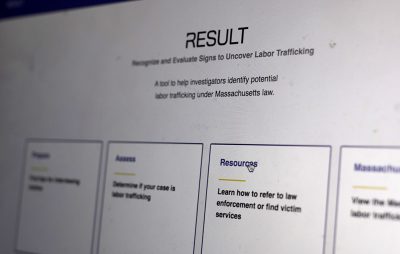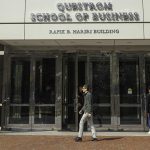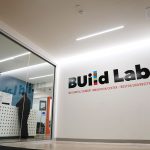A new website called RESULT is on track to achieve substantial “results” in combating the harms of labor trafficking. The project, which stands for “Recognize and Evaluate Signs to Uncover Labor Trafficking,” is a collaboration between the Massachusetts Attorney General’s Office, BU Spark! and BU students and faculty.

Savannah Majarwitz, a project manager for this initiative and senior in the College of Arts and Sciences, said RESULT is “used to help police, law enforcement inspectors [or] anyone in that kind of first responder role to help identify signs of labor trafficking.”
Through an assessment format, the website allows users to identify signs of a situation being an instance of labor trafficking. Majarwitz said the team is also creating an interactive resource guide trafficking victims can use.
Fellow team member and senior in CAS Preksha Munot said labor trafficking is “significantly underreported” in Massachusetts.
“[Labor trafficking and exploitation are] both bad, but they are very hard to distinguish, and indicators are very hard to spot,” Munot said.
Majarwitz and Munot were part of the team of six hired through the BU Spark! Experiential Learning Summer Internship. The other BU students on the team include Siddhant Kothari, Zhassulan Kaishentayev, Grace Yoon and Sarai Thach. Majarwitz’s responsibilities included making sure the various collaborators understood the project’s scope. Munot served as the lead UX designer and tech lead, helping “improve on the user flow and the overall feel of the website.”
“Everyone was very passionate about the project. [The clients] were very helpful with information,” Munot said. “They’ve outlined the user’s frustrations and their needs, and I was able to work with them to come up with a really good product at the end of the summer.”
This project draws on students and faculty from various disciplines. Faculty collaborators included Julie Dahlstrom from BU Law’s Immigrants’ Rights & Human Trafficking Program and Kaija Schilde and Noora Loori from the Forced Migration and Human Trafficking Initiative at the Frederick S. Pardee School of Global Studies.
Ziba Cranmer, executive director of BU Spark!, wrote in an email that the collaborators have “expertise and external contacts in the field that have provided project opportunities for students to build technology solutions that our partners may not have had the capacity to pursue otherwise.”
Majarwitz, an international relations major, used her non-technical background to her advantage when contributing to this project.
“It’s really important to have people who are involved in tech so deeply … because oftentimes certain clients are non-technical,” Majarwitz said. “The [tech] team explains it to me … and then I can kind of interpret it back to the client in a way that’s digestible for them too.”
She advises students to “be open to new things” and “not be afraid to ask questions” as they explore multidisciplinary fields.
RESULT is among the many initiatives to combat labor trafficking, Cranmer wrote.
“The app has already been used to train hundreds of investigators,” Cranmer wrote. “We have [also] been working with the AGO’s Fair Labor Division on a data science project that aimed to help focus their investigations on the highest risk sites given the tens of thousands of complaints received.”














